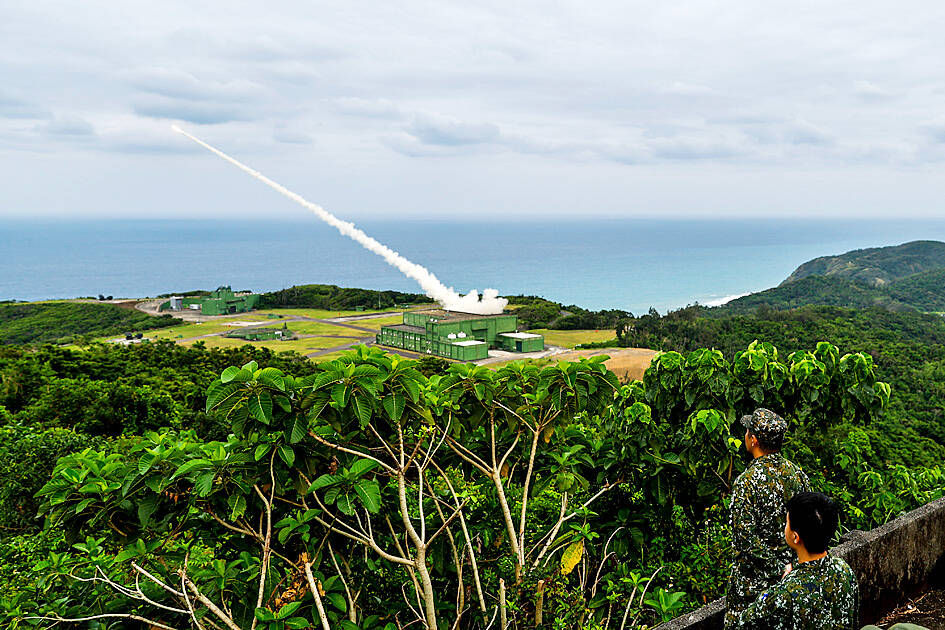“Signal abnormalities” that occurred during a live-fire test of M142 High Mobility Artillery Rocket Systems (HIMARS) earlier this month were caused by a fire control malfunction, rather than signal jamming from China, the Ministry of National Defense (MND) said yesterday.
Signal errors occurred twice during a missile test at Jiupeng Military Base in Pingtung County on May 12. During the test, 33 rockets were fired. The defense ministry had said that errors were promptly addressed by personnel participating in the test.
The ministry faced questions about the errors in a meeting of the legislature’s Foreign Affairs and National Defense Committee, which was scheduled to release frozen defense funding.

Photo: Ritchie B. Tongo, EPA-EFE
Signal abnormalities emerged during the transmission of the firing command to the fire control computer, Army Chief of Staff Lieutenant General Chen Chien-yi (陳建義) told lawmakers.
After addressing the self-diagnostic fault message from the computer following the procedures given by the US weapon systems contractor, testing was resumed, Chen said, adding that the M142 HIMARS is an advanced US weapon system.
After the test, the defense ministry immediately reported the issue to the contractor, he said.
They told the ministry that the HIMARS’ core functions were intact, and that abnormalities were mainly as a result of a known “sporadic software issue” in the computer’s self-diagnostic check, which has been reported by the US military and other countries that use the system, he said.
An update would be implemented as soon as possible, he added.
Chen denied speculation that the Jiupeng Military Base experienced magnetic interference, signal jamming, “GPS spoofing” or other interference from the Chinese People’s Liberation Army.
“The military had all potential magnetic interferences and signal reception from the enemy in and around the base under control. There was nothing abnormal in this regard during the test,” Chen said.
Taiwan has purchased 29 of the latest HIMARS from the US, and the first shipment of 11 was delivered in October last year.
Separately, the committee decided to release NT$84.5 billion (US$2.82 billion) of frozen funding, with two cases awaiting final approval in the plenary session.
Additional reporting by CNA

“China is preparing to invade Taiwan,” Deputy Minister of Foreign Affairs Francois Wu (吳志中) said in an exclusive interview with British media channel Sky News for a special report titled, “Is Taiwan ready for a Chinese invasion?” the Ministry of Foreign Affairs said today in a statement. The 25-minute-long special report by Helen Ann-Smith released yesterday saw Sky News travel to Penghu, Taoyuan and Taipei to discuss the possibility of a Chinese invasion and how Taiwan is preparing for an attack. The film observed emergency response drills, interviewed baseball fans at the Taipei Dome on their views of US President

The Central Weather Administration (CWA) today issued a "tsunami watch" alert after a magnitude 8.7 earthquake struck off the Kamchatka Peninsula in northeastern Russia earlier in the morning. The quake struck off the east coast of the Kamchatka Peninsula at 7:25am (Taiwan time) at a depth of about 19km, the CWA said, citing figures from the Pacific Tsunami Warning Center. The CWA's Seismological Center said preliminary assessments indicate that a tsunami could reach Taiwan's coastal areas by 1:18pm today. The CWA urged residents along the coast to stay alert and take necessary precautions as waves as high as 1m could hit the southeastern

The National Museum of Taiwan Literature is next month to hold an exhibition in Osaka, Japan, showcasing the rich and unique history of Taiwanese folklore and literature. The exhibition, which is to run from Aug. 10 to Aug. 20 at the city’s Central Public Hall, is part of the “We Taiwan” at Expo 2025 series, highlighting Taiwan’s cultural ties with the international community, National Museum of Taiwan Literature director Chen Ying-fang (陳瑩芳) said. Folklore and literature, among Taiwan’s richest cultural heritages, naturally deserve a central place in the global dialogue, Chen said. Taiwan’s folklore would be immediately apparent at the entrance of the

ECONOMIC BENEFITS: The imports from Belize would replace those from Honduras, whose shrimp exports have dropped 67 percent since cutting ties in 2023 Maintaining ties with Taiwan has economic benefits, Ministry of Foreign Affairs officials said yesterday, citing the approval of frozen whiteleg shrimp imports from Belize by the Food and Drug Administration (FDA) as an example. The FDA on Wednesday approved the tariff-free imports from Belize after the whiteleg shrimp passed the Systematic Inspection of Imported Food, which would continue to boost mutual trade, the ministry said. Taiwan’s annual consumption of whiteleg shrimps stands at 30,000 tonnes, far exceeding domestic production, the ministry said. Taiwan used to fill the gap by importing shrimps from Honduras, but purchases slumped after Tegucigalpa severed diplomatic ties with Taiwan